Canadian Climbing Medicine Symposium 2017
The first Canadian Climbing Medicine Symposium is coming to Toronto from July 31 to August 1, 2017. We caught up with the symposium organizer, Dr. Yasser El-Sheikh and discussed injury prevention, the guest speakers coming to the event and his early days climbing at Rattlesnake Point.
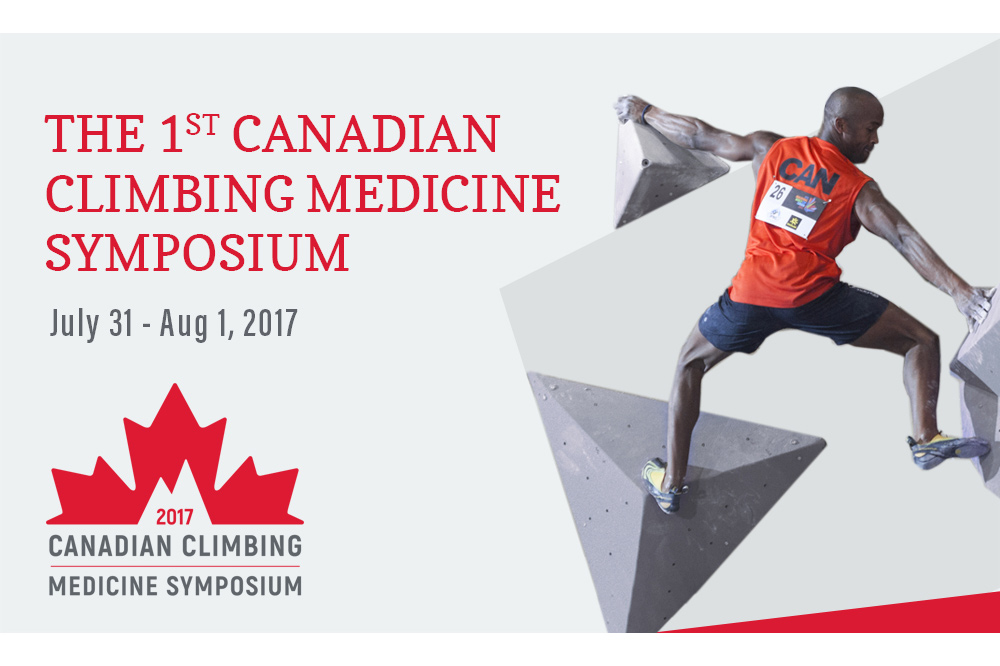
Ok, let’s start with the easy stuff. When and how did you get into climbing?
Yasser El-Sheikh: I started climbing in 1991, about 26 years ago, at a time when most people, myself included, had never really heard of rock climbing. Some friends invited me to join them for a rock climbing trip, after they had just taken an outdoor ropes course at the infamous Rattlesnake Point. We went there and did some top-roping. That was a fun experience, but at the time, more terrifying than fun for me. It wasn't until about six months later, when the same friends took me to Joe Rockhead's Climbing Gym (the only gym in Canada at the time), that the sport really clicked for me. It was a much less intimidating environment and I could enjoy the movement aspects of the sport without being afraid. For me, it was a better place to start. Before climbing, I had played most traditional sports and was also very much into skateboarding, Taekwondo, skiing and tennis. Since discovering climbing, I haven't spent much time with other sports.
Now that we have that out of the way, care to share your professional credentials with the readers?
Yasser El-Sheikh: Sure, but this is gonna be a long, boring list. Sorry.
My bachelor of science is in kinesiology, from the University of Waterloo.
I did my medical training and plastic surgery residency at McMaster University.
I then did an additional clinical fellowship in hand and microsurgery at the Bunke Clinic in San Francisco.
After that, I came back to Toronto and started my plastic surgery practice in 2010.
My practice is now pretty sub-specialized, with a focus in hand, wrist and peripheral nerve surgery, cosmetic surgery, and sport climbing medicine.
My climbing medicine appointments include Corresponding Member of the UIAA Medical Commission, Founder/Director of the Canadian Climbing Medicine Symposium and Climbing Medicine Canada, and medical consultant for Joe Rockhead's Indoor Rock Climbing Gym.
My bachelor of science is in kinesiology, from the University of Waterloo.
I did my medical training and plastic surgery residency at McMaster University.
I then did an additional clinical fellowship in hand and microsurgery at the Bunke Clinic in San Francisco.
After that, I came back to Toronto and started my plastic surgery practice in 2010.
My practice is now pretty sub-specialized, with a focus in hand, wrist and peripheral nerve surgery, cosmetic surgery, and sport climbing medicine.
My climbing medicine appointments include Corresponding Member of the UIAA Medical Commission, Founder/Director of the Canadian Climbing Medicine Symposium and Climbing Medicine Canada, and medical consultant for Joe Rockhead's Indoor Rock Climbing Gym.
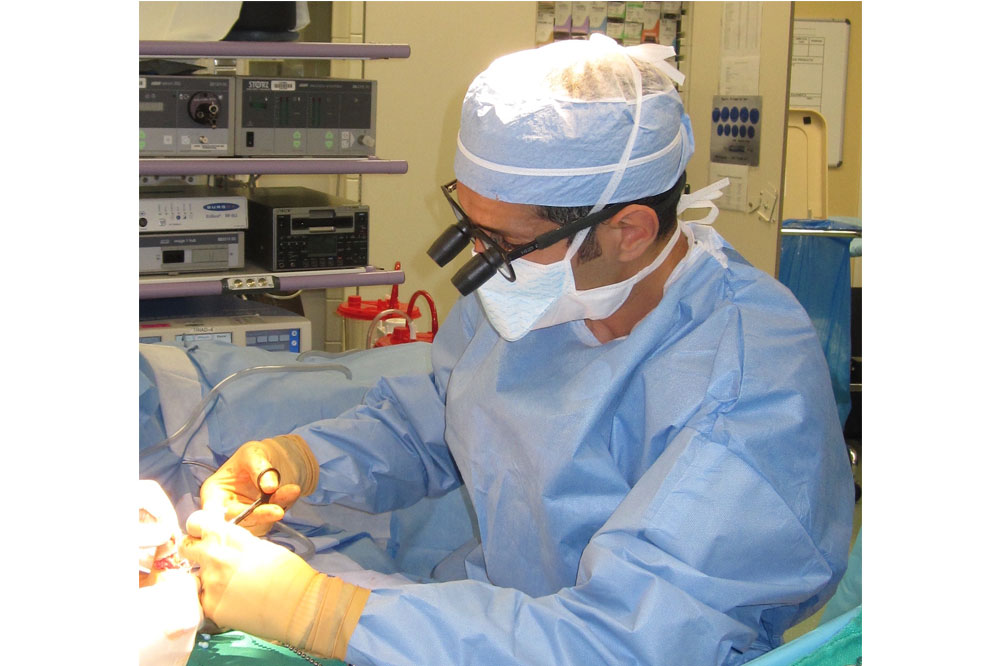
Canadian Climbing Medicine Symposium organizer Yasser El-Sheikh performing surgery.
You are organizing the first Canadian Climbing Medicine Symposium. What do you hope to achieve with this event and who do you think can benefit from attending?
Yasser El-Sheikh: I'm a climber and I love climbing, so my main goal with climbing medicine, and the symposium, is to give back to the community that has given me so much over the years.
Climbing and training for climbing, are becoming more popular every year. This popularity is now growing even more rapidly now with climbing’s inclusion in the 2020 Summer Olympics. There’s a lot happening on a national level to develop and legitimize our climbing sport programs, and climbing health needs to be a part of that push.
There are many bright, dedicated people in Canada, and internationally, working on expanding our knowledge of how to treat/prevent sport climbing injuries and train effectively for maximum performance. The goal of the symposium is to bring these people together to share this evolving knowledge.
The symposium is open to anyone interested in learning about climbing medicine and performance, including health practitioners, exercise scientists, coaches, trainers, climbers, students and caregivers of young climbers.
Climbing and training for climbing, are becoming more popular every year. This popularity is now growing even more rapidly now with climbing’s inclusion in the 2020 Summer Olympics. There’s a lot happening on a national level to develop and legitimize our climbing sport programs, and climbing health needs to be a part of that push.
There are many bright, dedicated people in Canada, and internationally, working on expanding our knowledge of how to treat/prevent sport climbing injuries and train effectively for maximum performance. The goal of the symposium is to bring these people together to share this evolving knowledge.
The symposium is open to anyone interested in learning about climbing medicine and performance, including health practitioners, exercise scientists, coaches, trainers, climbers, students and caregivers of young climbers.
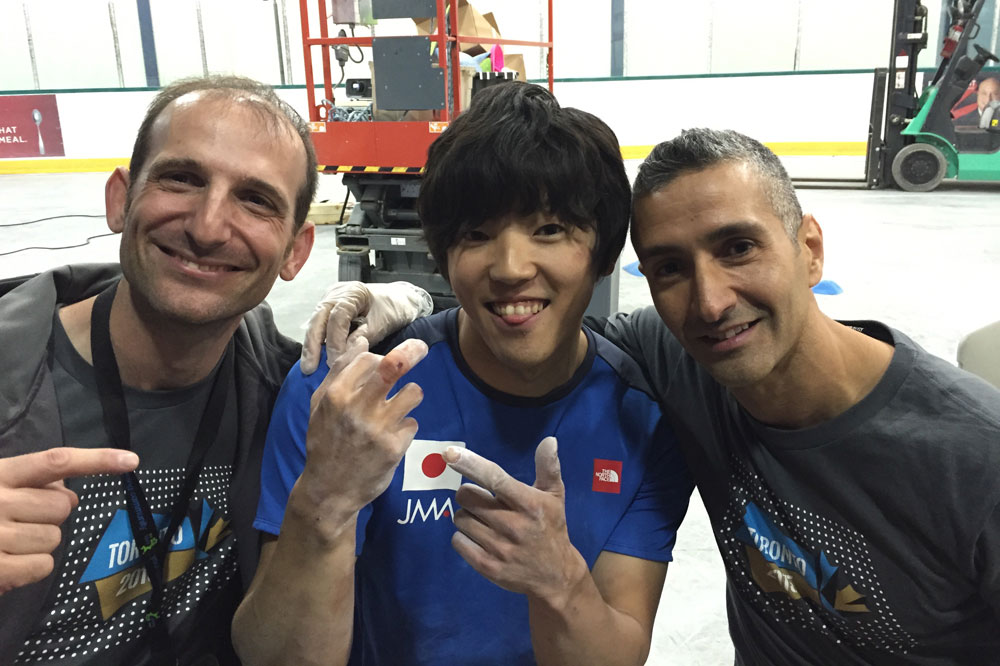
Dr. Sommer and Dr. Yasser El-Sheikh after having just stitched Kokoro Fujii's finger at the 2015 Toronto Boulder World Cup.
Where is the event being held?
Yasser El-Sheikh: The two-day symposium is being held on July 31 and August 1, 2017, at the Steam Whistle Brewery in Toronto Canada. We're very excited about the venue, which is a beautiful heritage building, located in the heart of the Entertainment District of downtown Toronto. And yes, we've arranged a beer tasting tour for all registered guests!
You’re bringing together a number of experts in the climbing medicine and training fields. Care to go over the list of speakers, their areas of expertise and some of the workshops/seminars they will be presenting?
Yasser El-Sheikh: Yes, we are extremely fortunate to be joined by several international experts in the fields of climbing medicine and training for climbing. Our invited speakers include Eric Hörst, Professor Volker Schoeffl, Dr. Isa Schöeffl and Dr. Herb von Schroeder. Combined, our speakers' expertise will ensure a breadth of topics at the symposium. All of them have bios far longer and more impressive than mine so that I won't detail them here, but you can read about them at our website: www.climbingmedicine.com
General topics will include management of various climbing injuries, epidemiology, biomechanics and anatomy, training for climbing, working with young athletes, national athletic development programs and yoga for climbing.
The general schedule on our website lists all of our planned educational and extracurricular activities.
General topics will include management of various climbing injuries, epidemiology, biomechanics and anatomy, training for climbing, working with young athletes, national athletic development programs and yoga for climbing.
The general schedule on our website lists all of our planned educational and extracurricular activities.
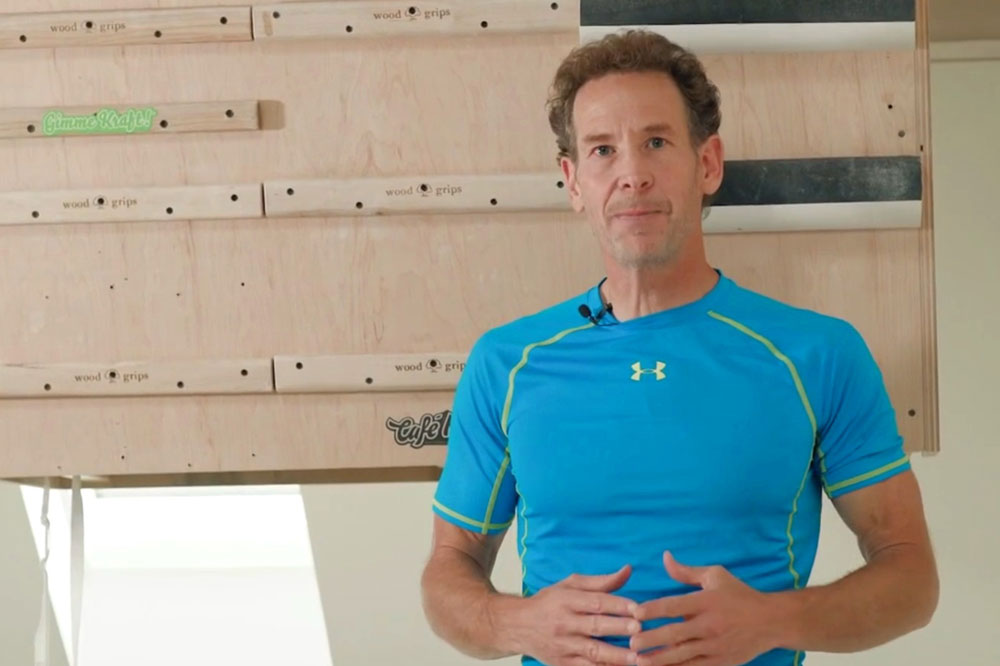
Canadian Climbing Medicine Symposium 2017 Speaker, Eric Hörst.
During your climbing and professional career, I assume you’ve seen more than your fair share of climbing injuries. Have you noticed any injury trends over the years?
Yasser El-Sheikh: That is a very interesting question, which we of course will be addressing at the symposium. In general, over the long-term we have seen a movement away from injuries related to falling, which occur more commonly in traditional climbing and mountaineering, to injuries related to climbing movement, which occur more frequently in difficult sport climbing, bouldering and training for these sports. As the level of difficulty increases, and with the introduction of new movements developed for competition climbing, we can expect to see more changes in the injury landscape over the next few years.
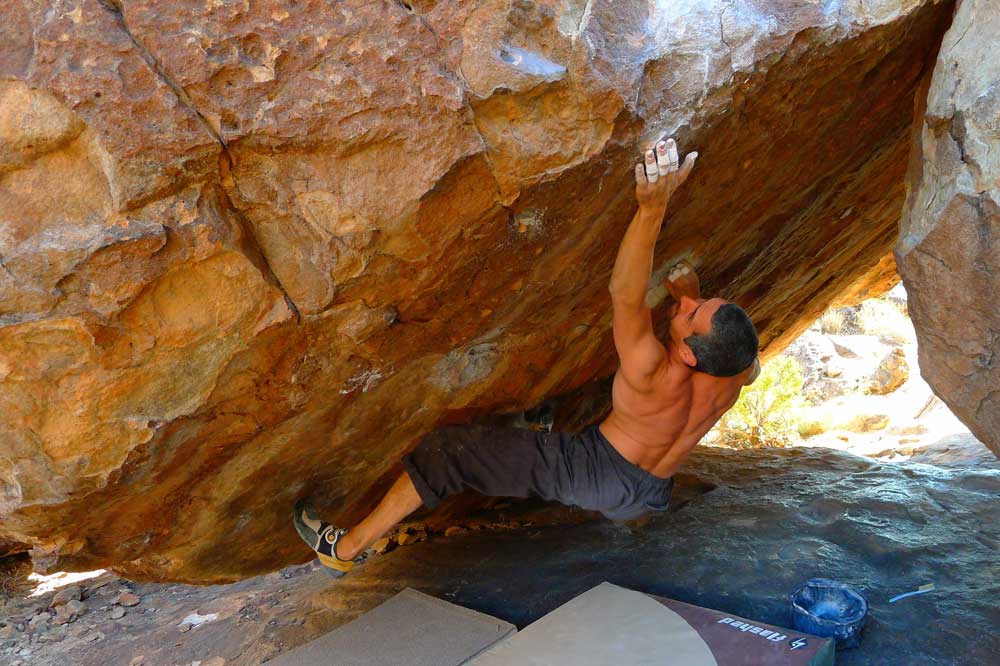
Canadian Climbing Medicine Symposium organizer Yasser El-Sheikh bouldering in Hueco Tanks.
Any general advice for avoiding injuries?
Yasser El-Sheikh: Good lord, so much to say here. Do you have a few days to talk? I really love this topic.
Avoiding injuries is much less about medicine and more about training. Effective training is safe training. I've been climbing for a quarter century, but it wasn't until I finished my studies five years ago that I really started to think seriously about effective training. When you're younger and you've only been climbing for a couple of years, you're going to improve no matter what you do, as long as you keep climbing and don't get injured. When I started climbing, we would spend three to eight hours a day at the climbing gym. Most of that time was spent sitting around and laughing with friends because we had all the time in the world. It was only when I got older, busier and more focused on progressing that I started really thinking about training properly. Today it's about maximizing every minute spent training and minimizing any fluff that creeps into your session. That shouldn't be your approach every day of course, but if it's a training day, then train! You should also have regular fun climbing days where you’re not thinking about training.
Sorry, I digress. Back to advice for avoiding injuries:
In terms of specific advice, I would say make sure to include general conditioning in your program. Strengthen your antagonist muscles (shoulder rotators, scapulothoracic muscles, push muscles, and other core strength) to keep your body strong and balanced. Many injuries are related to pathologic movement patterns caused by muscle imbalances around our joints.
Next, listen to your body. When you are a less experienced climber, this sounds like very nebulous advice because you don't know what your body is supposed to feel like when you're climbing well. But with experience, you’ll learn what it feels like to have a strong day or weak day. Once you have that awareness, it’s up to you to know when to stick to the plan, because you're feeling good, and when to back off or change it up, because you're not feeling quite right. For example, if you don't feel powerful that day, don't train power! You're less likely to benefit from the workout and much more likely to get injured trying.
Avoiding injuries is much less about medicine and more about training. Effective training is safe training. I've been climbing for a quarter century, but it wasn't until I finished my studies five years ago that I really started to think seriously about effective training. When you're younger and you've only been climbing for a couple of years, you're going to improve no matter what you do, as long as you keep climbing and don't get injured. When I started climbing, we would spend three to eight hours a day at the climbing gym. Most of that time was spent sitting around and laughing with friends because we had all the time in the world. It was only when I got older, busier and more focused on progressing that I started really thinking about training properly. Today it's about maximizing every minute spent training and minimizing any fluff that creeps into your session. That shouldn't be your approach every day of course, but if it's a training day, then train! You should also have regular fun climbing days where you’re not thinking about training.
Sorry, I digress. Back to advice for avoiding injuries:
In terms of specific advice, I would say make sure to include general conditioning in your program. Strengthen your antagonist muscles (shoulder rotators, scapulothoracic muscles, push muscles, and other core strength) to keep your body strong and balanced. Many injuries are related to pathologic movement patterns caused by muscle imbalances around our joints.
Next, listen to your body. When you are a less experienced climber, this sounds like very nebulous advice because you don't know what your body is supposed to feel like when you're climbing well. But with experience, you’ll learn what it feels like to have a strong day or weak day. Once you have that awareness, it’s up to you to know when to stick to the plan, because you're feeling good, and when to back off or change it up, because you're not feeling quite right. For example, if you don't feel powerful that day, don't train power! You're less likely to benefit from the workout and much more likely to get injured trying.
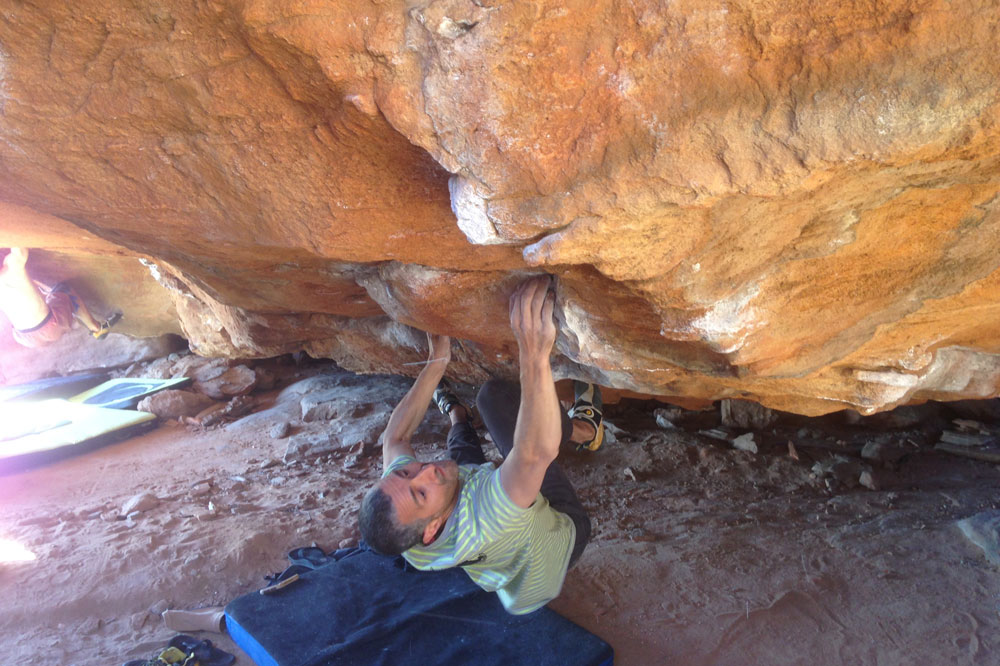
Canadian Climbing Medicine Symposium organizer Yasser El-Sheikh bouldering in Rocklands.
With the explosive growth in youth climbing, there has been a growing interest on how the sport is physically impacting these young athletes. Do you have any advice that may help young climbers avoid any injuries while their bodies are still maturing?
Yasser El-Sheikh: Definitely!
First of all, read my answer to the previous question. It applies to everyone, but mostly to young athletes. You will develop very specific strengths and skills in climbing, but if you don't develop your body in a general way, you will cause muscle imbalances and ultimately get injured or just never reach your full potential.
Secondly, a young climber should never ignore persistent pain, especially in the fingers. If you have pain in the finger for longer than one week, you must get an X-Ray and see an experienced climbing-medicine health provider. Finger growth plate fractures are injuries specific to young climbers, and if not properly diagnosed, can end your climbing career, or lead to disabling finger deformity in the future.
Lastly, in your first few years of climbing you should focus on developing good skills and learning a variety of movement patterns, rather than trying to get stronger. You will be a much better and healthier climber in the long run if you can build strength and power over time on a base of good movement and technique.
First of all, read my answer to the previous question. It applies to everyone, but mostly to young athletes. You will develop very specific strengths and skills in climbing, but if you don't develop your body in a general way, you will cause muscle imbalances and ultimately get injured or just never reach your full potential.
Secondly, a young climber should never ignore persistent pain, especially in the fingers. If you have pain in the finger for longer than one week, you must get an X-Ray and see an experienced climbing-medicine health provider. Finger growth plate fractures are injuries specific to young climbers, and if not properly diagnosed, can end your climbing career, or lead to disabling finger deformity in the future.
Lastly, in your first few years of climbing you should focus on developing good skills and learning a variety of movement patterns, rather than trying to get stronger. You will be a much better and healthier climber in the long run if you can build strength and power over time on a base of good movement and technique.
Ok, how about some injury prevention advice for aging climbers?
Yasser El-Sheikh: Ha ha. Of course. First, read my answers to the previous two questions!
In general, the “quality over quantity” rule is even more important for older climbers. We usually have less time to commit to climbing, so adequate rest is key for us because we need more recovery time. You should train and climb less, but make it count when you're doing it.
In general, the “quality over quantity” rule is even more important for older climbers. We usually have less time to commit to climbing, so adequate rest is key for us because we need more recovery time. You should train and climb less, but make it count when you're doing it.
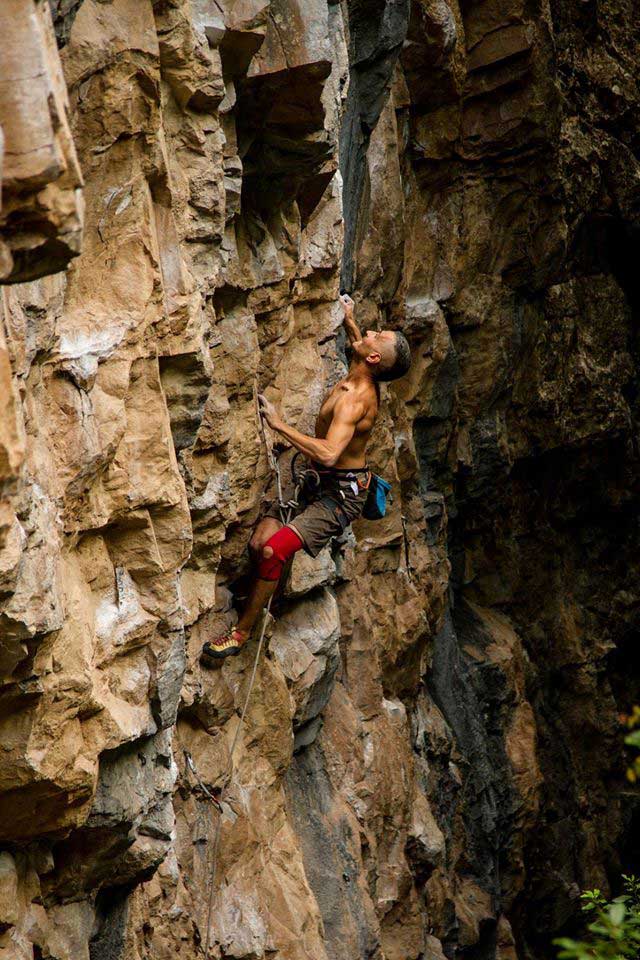
Canadian Climbing Medicine Symposium organizer Yasser El-Sheikh pulling down in Rifle. Not bad for an old guy.
Let’s say I’m a climber that’s just been injured. Nothing dramatic mind you, just the typical finger/shoulder/elbow stuff. With all the seemingly conflicting medical information (“paging Dr. Google”) what would you suggest is the best approach for getting the proper care and not wasting my time with ineffective or even counter-productive treatments?
Yasser El-Sheikh: Overall, online advice is a great place to start because there is a lot of good stuff out there, but unfortunately it's difficult to know what advice to trust. I would say that whatever you read, know who wrote it and understand on what information they are basing their advice. Unfortunately, most healthcare providers, even sports medicine practitioners, are very unfamiliar with climbing injuries. You need to seek advice from someone who has experience with climbing medicine.
In terms of online advice, I have a Facebook page called Rock Doc, where you can reach me with questions. I will do my best to help you online, arrange for you to see me in consultation, or at the very least, direct you to somewhere you can get advice.
Also, a great book that every climber should have in their library is One Move Too Many, by Dr. Volker Schöeffl. It’s very comprehensive, yet written for climbers with no medical background. Every climbing injury you could face is in that book as well as some good general advice for dealing with each injury. The new edition just came out last year, so pick it up.
Anyone registering for the symposium, will receive a copy of One Move Too Many, by Professor Schoeffl and Training for Climbing, by Eric Hörst.
In terms of online advice, I have a Facebook page called Rock Doc, where you can reach me with questions. I will do my best to help you online, arrange for you to see me in consultation, or at the very least, direct you to somewhere you can get advice.
Also, a great book that every climber should have in their library is One Move Too Many, by Dr. Volker Schöeffl. It’s very comprehensive, yet written for climbers with no medical background. Every climbing injury you could face is in that book as well as some good general advice for dealing with each injury. The new edition just came out last year, so pick it up.
Anyone registering for the symposium, will receive a copy of One Move Too Many, by Professor Schoeffl and Training for Climbing, by Eric Hörst.
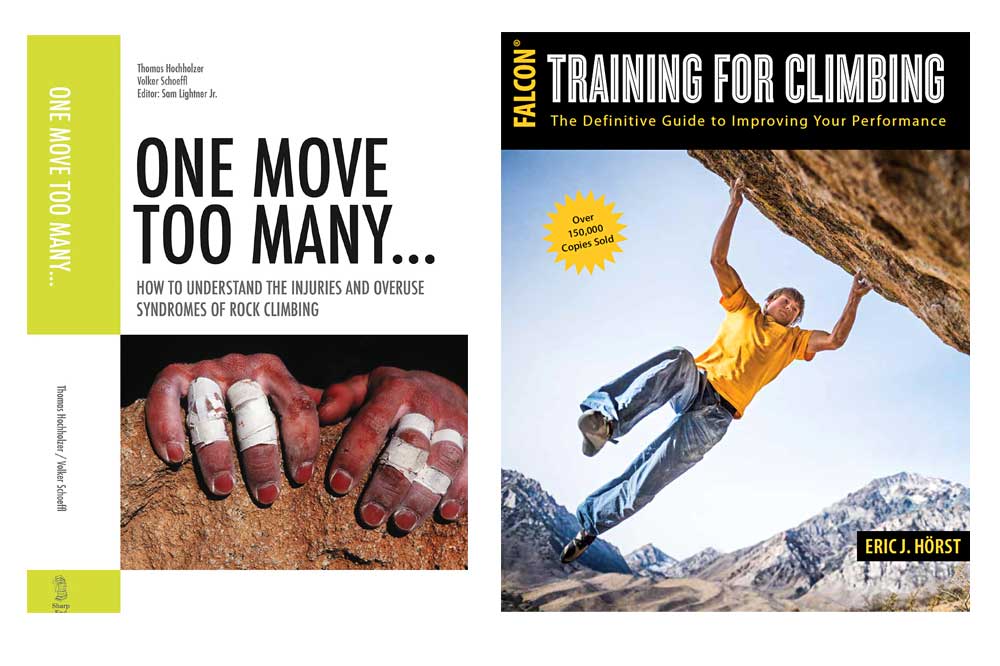
Anyone registering for the symposium, will receive a copy of One Move Too Many, by Professor Schoeffl and Training for Climbing, by Eric Hörst.
Finally, where can folks get tickets for the Symposium?
Yasser El-Sheikh: Registration is online at our website, www.climbingmedicine.com
Unfortunately, spaces are very limited, so register early if you'd like to join us!
Unfortunately, spaces are very limited, so register early if you'd like to join us!
More details about Canadian Climbing Medicine Symposium 2017 are available at http://www.climbingmedicine.com/


